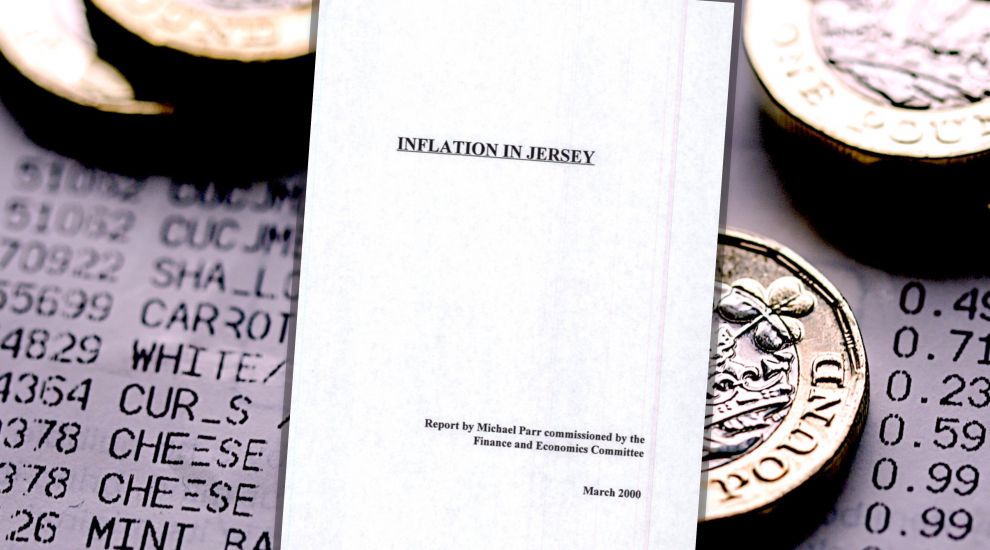


With Jersey continuing to suffer from historic rates of inflation and a cost of living crisis, has anything changed from two decades ago when it emerged that the island's rate of inflation had risen to more than twice the United Kingdom level?
In 2000, the Finance and Economics Committee commissioned independent economist Michael Parr to conduct a report on inflation in Jersey, appropriately entitled 'Inflation in Jersey'.
It was chiefly commissioned as, at the end of 1999, Jersey’s reported rate of inflation had risen “significantly above that of its Channel Island neighbour, Guernsey, and also the UK mainland.”
At the time the report was written, Jersey's inflation rate was running at 4.4%. The most recent inflation report for 2023 put it at 12.7%.
The report aimed to determine the possible causes of the inflation at the time, its potential impacts, and what the Government should do about it.
Now, 20 years after its publication, the report seems to demonstrate more than anything that some things don't change...
One of the key drivers of inflation in 2000 was rising house prices.
Mr Parr notes in the report: "Since 1996, house prices have risen over 50%."
The latest RPI statistics, released in March 2023, reported that house prices had risen over 27% over a 12-month period.
Mr Parr notes that food, motoring, household goods, clothing and footwear were also "all sectors where there seems to be particularly a problem in Jersey".
The reason for this, he stated, was that Jersey lacks "effective competition in these sectors, which leads to poor cost control and inefficiency and enables price rises to be imposed".

Pictured: Food price rises were an issue then as now.
Jersey's March 2023 RPI report showed that food prices had risen by nearly 16% over a 12-month period. Household goods rose by over 13% in the same period.
The report also cited the rising cost of oil, indirect taxation on alcohol, cigarettes and petrol, rising wages outstripping gains in productivity, and an incredibly low unemployment rate as reasons for inflation.
At the time of Mr Parr's report, 201 people were registered as unemployed in a workforce of 53,500, making the unemployment rate 0.4%.
Moreover, there were 351 vacancies, which he said suggested that the economy was "being run beyond its capacity limits".
The report stated that this created "potential for well above RPI wage rises to occur as labour retention is a big current problem for Jersey companies, with staff turnover very high as people seek (and can find) better paid jobs".
Today, Jersey has around 400 people registered as 'actively seeking work' – this label applies to those who are not in some kind of paid employment, making the current unemployment rate around 0.6%.
The main concern raised in the report was that Jersey's inflation rate of 4.4% was surpassing that of both Guernsey, who had an inflation rate of 2.4% at the time, and the UK, with only 1.8%.
Mr Parr explained: "If the Jersey rate of inflation is greater than elsewhere and particularly the UK, so Jersey becomes less attractive to UK mainland customers."

Pictured: "This may have led to a possible over dependence on the financial sector..."
He adds later that this disparity likely was likely impacting the island's economy.
Mr Parr said that Jersey's relatively high inflation rate "has probably contributed to the problems of the agriculture and tourism pillars of of the economy and which will certainly be storing up more problems for the future associated with the loss of competitiveness".
He added: "In turn this may have led to a possible over-dependence on the financial sector, which is, in general, highly mobile globally if local condition were to be seen as too expensive or restrictive (e.g. in terms of available labour and housing supply)."
In March 2023, Jersey's inflation rate was 3.8% higher than that of the UK.
Click here to read Mr Parr's report in full.
Low-income homes suffer biggest cost-of-living blow since 2007
Comments
Comments on this story express the views of the commentator only, not Bailiwick Publishing. We are unable to guarantee the accuracy of any of those comments.